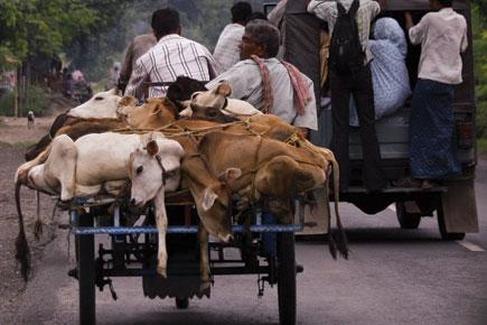By, Syed Rezaul Karim (Dhaka Tribune)
Dhaka, August 11: An integrated and upgraded land port at Benapole border has been jointly inaugurated recently by Prime Minister Sheikh Hasina, Prime Minister of India Narendra Modi, and Chief Minister of West Bengal Mamata Bannerjee. This landmark land port with latest infrastructural facilities is expected to augment the bilateral trade further between the two friendly countries.
However, the newly expanded land port will not witness the truck load of Indian cows which are imported into Bangladesh normally. Due to a ban on the export of cows by India to Bangladesh, the legal import of cows from India does not exist ,though India exports million tons of meat, mostly of buffalo, every year to many Muslim countries around the globe.
Even though buffalo and cows have an identical physiology and perhaps a common genetic lineage, cows are holy in India but not buffaloes. The cow is a deity to Hindus and is worshipped as such. The religious hysteria against cow slaughter in India is whipped up occasionally by ultra nationalists, such as Bajrang Dal, cow protection vigilantes , and by Sangh Parivar allied to the ruling Bharatiya Janata Party (BJP).
Slaughtering cows is banned in Gujarat, Maharashtra, Haryana, Delhi, Madhya Pradesh, Uttar Pradesh, and some of the northern Indian states. Very recently, the High Court of Himachal Pradesh has asked the Indian government to ban cow slaughter across India. But the slaughter is not banned in West Bengal, Kerala, Sikkim, Arunachal Pradesh, Mizoram, and some other places.
There was a brutal incident in Dadri, a place in Uttar Pradesh last year, where an old Muslim man was killed by a Hindu mob of the same village for allegedly keeping beef in his house. But later it was proved by forensic test that the meat was of buffalo.
Recently, two Muslim women were beaten mercilessly by a Hindu mob in front of the police in Madhya Prodesh for allegedly carrying 30 kilograms of beef. It was later found that the meat was that of buffalo.
Such is the religious fanaticism and frenzy in the name of protecting cows.
Rationale of Smuggling Cows
India is the home of the largest cattle population in the world (301 million in one estimate) and the highest exporter of meat in the world (2 million tons in 2015). By contrast, Bangladesh has a cattle population of only 25 million. Given the demand for beef in Bangladesh, there is a serious shortage of meat. The per capita meat requirement of Bangladesh is 43.25kg, but the availability of it is only 9.12kg, indicating an almost 79 % deficit.
In the past, Indian cows brought into the country, legally and illegally, to a certain extent, helped to mitigate the demand and keep the price of beef stable.
It is the shortfall in the supply of meat in Bangladesh that drives the traders to illegally trade cows from India. Trade through import permit or license would have reduced smuggling.
With the BJP in power in India, restrictions on the movement of cows to Bangladesh were reinforced with vigor. Indian Home Minister of India Rajnath Singh visited the Indo-Bangladesh border and Assam shortly after the BJP took power. His twin directives were maintenance of strict border security by the Indian Border Security Force to stop movement of cows from India and to stop illegal immigrants from Bangladesh to Assam. It seems cattle and humans got an equal treatment in the eye of the minister.
Economic theory would tell us when there is a demand for goods and services in one country, and there exists a price advantage in the supply of those goods and services in another country, trade takes place. But when that normal channel is thwarted by political or other considerations, trade takes a different route, subverting the natural one.
The Bangladesh-India border has witnessed killings of dozens of Bangladeshi cattle traders by India’s Border Security Force. But the smuggling of cows has not totally stopped. The demand of the Bangladesh traders was equally reciprocated by their Indian counterparts knowing full well that the trade is illegal.
Smuggling of cows from India deprives both the Indian and Bangladesh governments of taxes that are nominally imposed. It also drains foreign exchanges from the country as the payment for the cows is made in either Indian currency or in dollars.
Smuggling reduces cost to the extent that the duties otherwise would have been payable. But the illegal trading in cows involves some transaction cost to facilitate the trade on both sides of the border.
The short run effect of banning cows from crossing over to Bangladesh is obviously the inflation of beef prices in the Bangladesh retail market. The price per kg of beef has gone up in the couple of years by more than 50 %. The rise in income in the country will also create additional demand. So the beef price is unlikely to show any downward trend.
The long run effect will be increased breeding of cows in Bangladesh. However, this increase in production is likely to be handicapped by lack of enough pastures and limited supply of land. Perhaps Bangladesh should now give its attention to importing cows from Myanmar.





























































